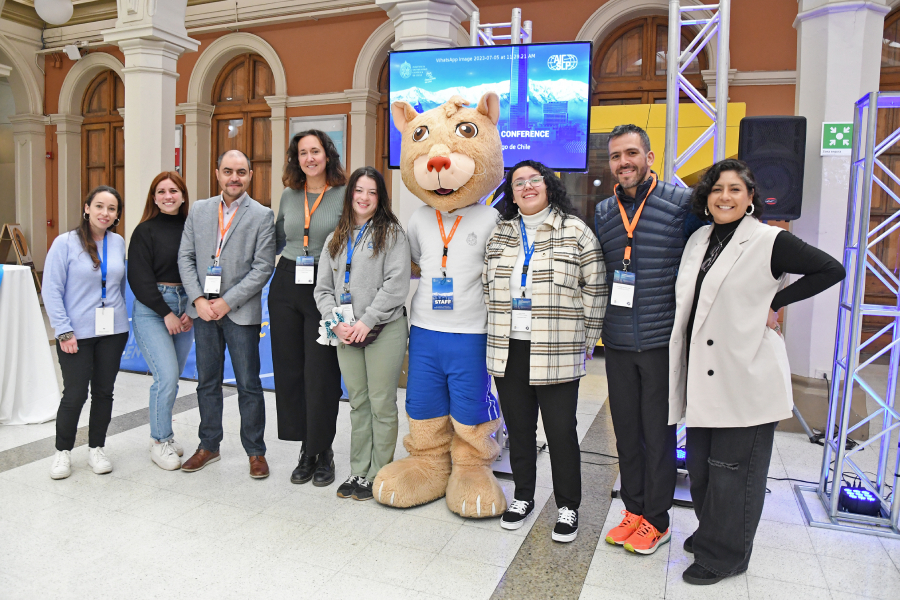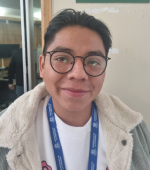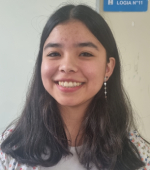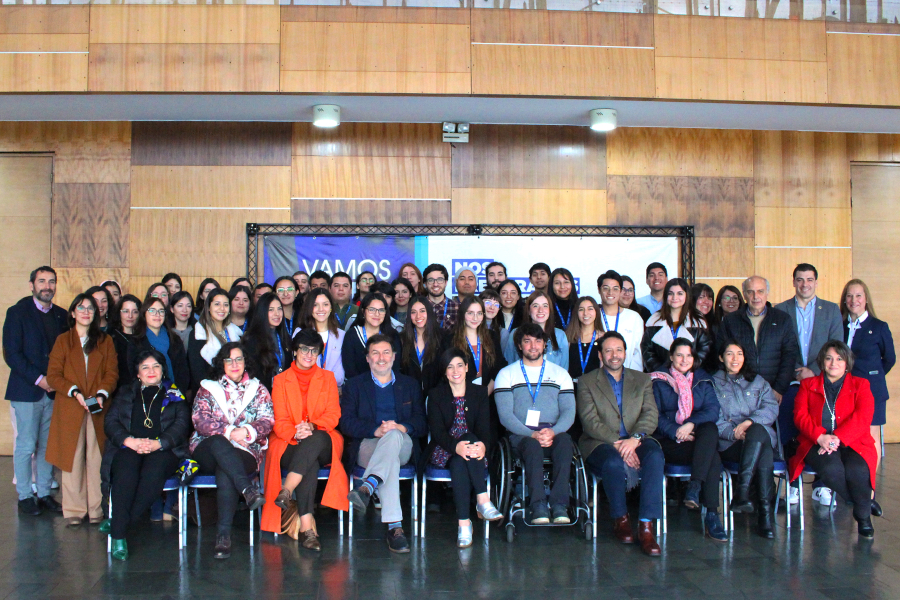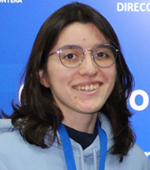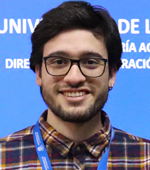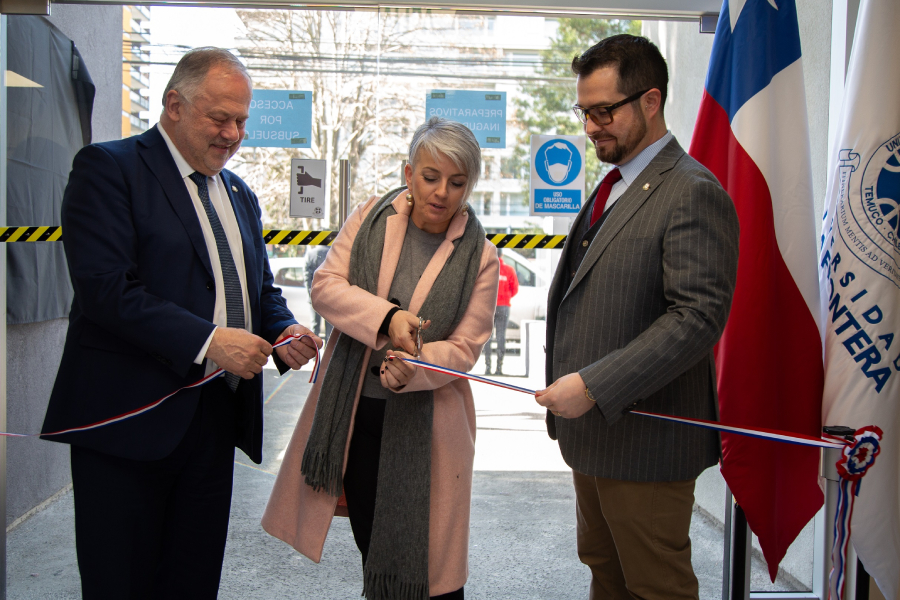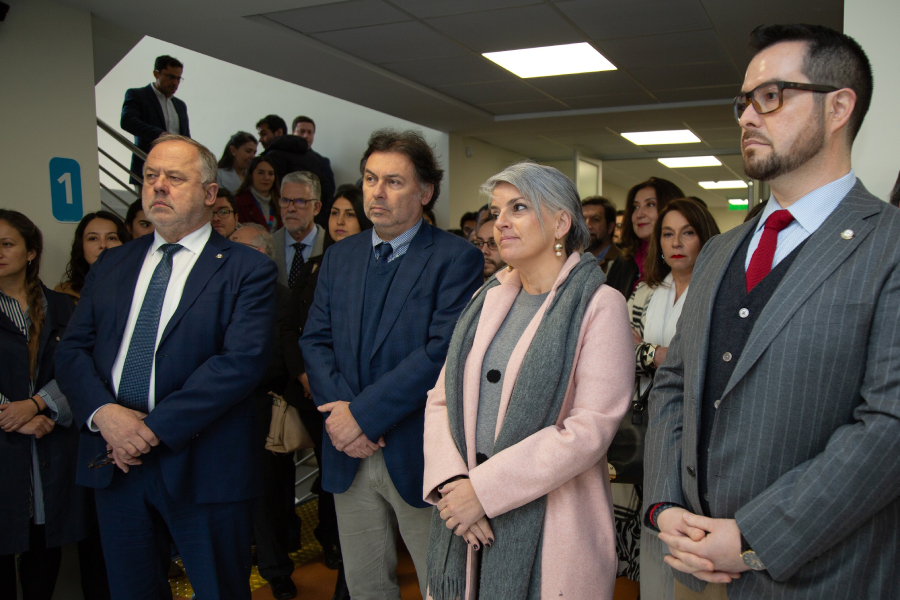|
The delegation of Universidad de La Frontera, with researchers of CIAM UFRO and students and graduates of the Physical Education, Sports and Recreation undergraduate program, participated in the International Conference, which took place at Pontifical Catholic University of Chile, in the city of Santiago de Chile this year. |
The aim of the AIESEP (International Association for Physical Education in Higher Education) International Conference is to promote quality research on physical education, physical activity and the teaching of sports. This year, it took place for the first time in Latin America, under the theme “Emerging horizons: Bridging the borders between physical education research and practice”. At the important event, Universidad de La Frontera (UFRO) had an outstanding active participation, with the largest delegation among the representatives of Chile, consisting of researchers of the Physical Literacy Research Centre (CIAM) and students and graduates of the Physical Education, Sports and Recreation undergraduate program, who presented their work in different modalities. One of the highlights of the congress was the Symposium “Physical literacy in Latin America: towards a contextualised development”, presented by CIAM UFRO. In this Symposium, the researchers Dr. Jaime Cárcamo and Dr. Catalina Rivera from UFRO (Chile), Dr. Isaac Estevan from University of Valencia (Spain) and Dr. Joao Martins from University of Lisbon (Portugal), presented their projects, research and experiences related to the development of physical literacy, and discussed the need for a contextualised implementation in Latin America. In addition to the symposium, other members of CIAM presented their work in different areas, such as Dr. Luis Henríquez, who presented his research on initial teacher training, addressing the issue “Didactic planning during professional internships”; and Nicolás Martínez, who presented the study “Motor competence and compliance with physical activity recommendations in Chilean schoolchildren”. In the poster presentations modality, the graduated physical education teacher Paulina Candia and the students Javiera Fuentes and Javiera Parada of the Physical Education, Sports and Recreation program of the Faculty of Education, Social Science and Humanities presented their respective work related to Motor Competence. The participation of the delegation of UFRO in the AIESEP International Conference 2023 allowed the international dissemination of the work of CIAM UFRO, the strengthening of their international partnerships, and a broader and more diverse view of their research and ongoing projects. It also demonstrates the commitment of the research team and the excellence of their work in the field of Physical Literacy, converting the Research Centre into a national reference in this field of knowledge. “These important participations and contributions strengthen our research and promote the development of more contextualised and effective approaches in Physical Education and the promotion of active lifestyle habits,” Dr. Jaime Cárcamo, the director of CIAM UFRO, explained. The next AIESEP International Conference will take place on May 13-17, 2024, at the University of Jyväskylä in Finland. It will be another great opportunity for the researchers, academics and professionals in the fields of Physical Education, Motor Competence and Physical Literacy to exchange knowledge and present the progress of their work in their fields of studies. Written by: Physical Literacy Research Centre, CIAM UFRO |
|
The International Affairs Office of the Vice-rectorate for Academic Affairs organized the farewell ceremony for the 29 undergraduate students who participate in the Student Mobility Program that allows them to go to universities in America and Europe. |
During the second semester of 2023, 29 undergraduate students of Universidad de La Frontera (UFRO) go to different universities in America and Europe with the Student Mobility Program of the International Affairs Office of UFRO. The International Affairs Office of the Vice-rectorate for Academic Affairs organized the farewell ceremony, at which Dr. Rodrigo Navia Diez, the Vice-rector for Research and Graduate Studies, highlighted the experiences the students will gain as global citizens and the positive impact on their peers when they share these experiences with them when they come back. This exchange is an overarching part of UFROs Internationalisation Strategy, which involves the fields of undergraduate and graduate studies, research and outreach. “It is an important effort of our university at the undergraduate level, that a significant number of our outgoing students receives structural funding, which is a privilege and a unique opportunity that will surely mark their lives. Any international experience in higher education is very important, in terms of education and professional training, as well as in terms of vocation and cultural knowledge. They will realise what it means to live somewhere else for a certain time, that it makes you more flexible, and how you make the most of this great opportunity,” Dr. Navia explained. The director of the International Affairs Office, Paulina Latorre Bahamóndez, highlighted the large number of students who make use of this semester’s student mobility opportunities. “We are one of the few universities in Chile that allocates so much funding for the international mobility of its undergraduate students, which is really positive. We always try to prepare our students, in line with our Educative Model and our Internationalisation Strategy, to be skilled professionals who know how to act in today’s world, which is modern, without frontiers, because these experiences will allow them to develop the qualities of a global citizen. Abroad, they are our ambassadors, but they will also be a bridge that connects their international experiences with our students, when they come back to Chile,” she pointed out. It is worth mentioning that thirteen of the students are able to start this educational adventure thanks to the scholarship “UFRO without Frontiers”, five thanks to the scholarship “Beca Santander” and two of them self-finance their internships. The Faculty of Education, Social Science and Humanities has also provided funding through its own grants, to support the international mobility of six of its students. “This year, we had the important opportunity to support even more of our students who wanted to go abroad. We are aware that these international experiences, in which they can get to know other realities, compare themselves and develop new skills, are very important for their own development, but also contribute to the development of the university’s training processes when they come back. It is a process of personal and intellectual maturity and a great experience in our globalised world. Therefore, it is a priority for us to support the students who want to go to our partner universities abroad,” said Dr. Juan Manuel Fierro, the dean of the Faculty of Education, Social Science and Humanities. Some of the students who start their mobility this second semester of 2023, are the Sociology student Joaquín Crisóstomo Sepúlveda, who goes to Sciences Po Rennes (France) for a year, thanks to the International Solidarity Fund scholarship; the Mechanical Engineering student Álex Martínez Farandato, who goes to University of Liège (Belgium) for a year within the DIUFRO project “Application of AI in the Modelling of the Behaviour of Metals”; and Benjamín Aguilar Quezada of the English Pedagogy program, who goes to University of Regina (Canada) with a scholarship of the Emerging Leaders in the Americas Program (ELAP). THE STUDENTS
Written and translated by: UFRO Communications Office |
|
Regional, local and university authorities participated in the official inauguration of the modern six-storey building with more than 4,800 m2, located in the city centre of Temuco. |
The inauguration of the new building for the Teaching Dental Clinic (CODA) of Universidad de La Frontera (UFRO), located in the city centre of Temuco, is another milestone for the community health in the La Araucanía region. The modern six-storey building is equipped with state-of-the-art technology and high biosafety standards, on more than 4,800 m2, with 100 treatment rooms and a parking lot, guaranteeing an optimal clinical training for the students of the Dentistry undergraduate program, the five graduate specialization programs and the advanced training courses. In addition, the new building has an operating department with three operating rooms, a central sterilization unit, a dental and maxillofacial radiology unit, classrooms and offices for administration. “This new first-level facility is of great importance for the training of our future dentists. At the same time, it is a great contribution to our regional community, since we can offer a timely treatment of high quality, accessible to the most vulnerable people in our city and region,” explained Dr. Eduardo Hebel Weiss, the rector of Universidad de La Frontera. He also emphasized the fundamental role of this new facility for the training of a new generation of dental specialists, as well as the development of dental research in response to new questions at the regional and national level. “We are very happy with this project, which was implemented after several years of dedication, in order to get to where we are now,” Dr. Hebel Weiss added. “As the Ministry of Technology, Science and Innovation, we are convinced that universities are essential for the development of our society. The new building is an example of that: it will be a centre for knowledge generation, the training of professionals who will contribute to an improvement for society from their fields of knowledge, research and technology transfer,” explained Maite Castro Gallastegui, the Regional Ministerial Secretary of the Ministry of Technology, Science and Innovation. BIOSAFETY The new building of UFROs Teaching Dental Clinic fulfils high biosafety standards and is advanced in digitalisation, with the Smile Dental Software, specialised in university dental clinics, which is a support in the management of the clinic and the digital records. “Although our primary objective as a public and state university is to train dental professionals, we must also be at the service of the people, in all dimensions of human dignity. Therefore, we need to follow the values that motivated the founders of our faculty more than 30 years ago in terms of community engagement in the professional training, which can be achieved through a deep connection with the local community in the teaching process. That way, our students will be able to transform illness into health and illuminate the people’s faces in our region, giving them their smiles back,” said Dr. Gonzalo Oporto Venegas, the dean of UFROs Faculty of Dentistry. The dean also explained that the Teaching Dental Clinic currently attends more than 2,800 patients, which is an important number at the regional and national level. To access treatments at the clinic, the patients have to apply through a special diagnostic system. Afterwards, they have to go to an initial examination to be referred to the corresponding services of the Faculty of Dentistry.
Written and translated by: UFRO Communications Office
|
|
The article by Dr. Rosa Reyes-Riveros addresses the connection between public urban green spaces and the human well-being. |
The journal Urban Forestry & Urban Greening recognised the article of the graduate of the Doctorate in Agri-food Science and Environment of Universidad de La Frontera (UFRO) as one of the most cited articles since 2020. The article “Linking public urban green spaces and human well-being: A systematic review” was published in 2021 and developed by Dr. Rosa Reyes Riveros, together with the researchers Adison Altamirano, Francisco De La Barrera, Daniel Rozas Vásquez, Lorena Vieli and Paula Meli. “I wrote this article when I was working on my doctoral thesis. It is about the relationship between public urban green spaces and human well-being, where human well-being is considered a multidimensional concept that encompasses health, security, good social relations, and freedom of choice and action,” Dr. Rosa Reyes explained. For the article, the research team performed a systematic bibliographic review to examine the interactions between specific characteristics of green spaces and essential elements for human well-being. Afterwards, they divided the green spaces characteristics found in 153 articles into four groups: structure, biodiversity, naturalness, and others; and the dimensions of human well-being into the four groups: health, security, good social relations, and freedom of choice and action. The expert explained that this issue is of great relevance, since several studies show the inequitable distribution of green spaces in big cities. “We would be talking about an inequitable distribution of the benefits they provide and be facing an issue of environmental injustice,” she pointed out. Despite the importance of public green spaces in urban environments, planning strategies keep using standardised criteria that leave out the benefits, which they provide for the human well-being. As a result, these strategies often result in a detriment of the spatial connectivity of green spaces and even the complete elimination of some of these areas. “I think that this article opens doors for research on issues that have not been widely addressed regarding the importance of public urban green spaces,” Dr. Reyes commented and expressed her surprise about the large number of citations of the article in such a short time. “Together with my supervising professors, we achieved a very comprehensive work, which, although it mainly addresses the environment, is also a multidisciplinary work that is useful for other fields of research, which is key for the high number of citations,” she explained. |





